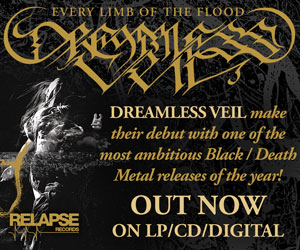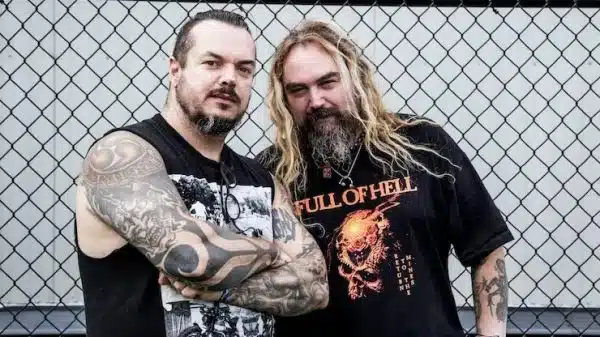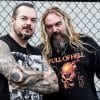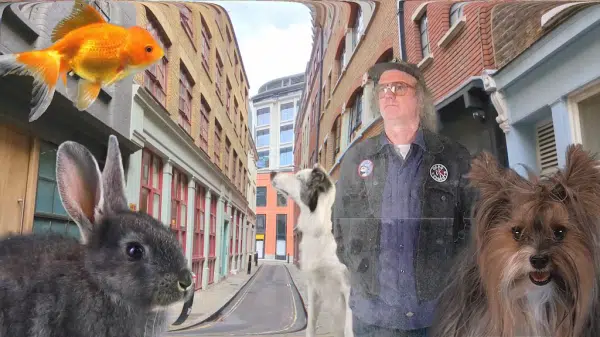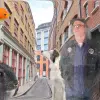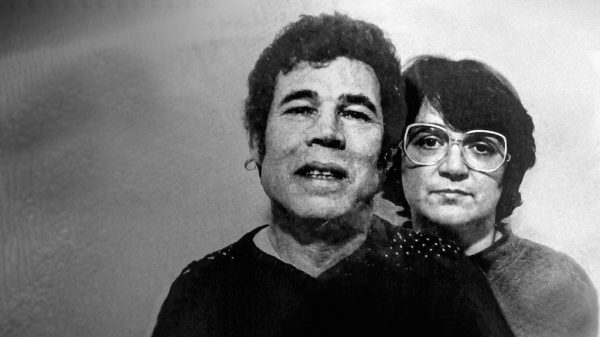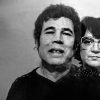Sūrya is a four piece experimental sludge/doom band based in London, UK. They are made up of Raquel (drums), Bartek (guitar), Greg (guitar) and Mark (bass).
After the release of their demo in 2015, they unleashed the stunning ‘Apocalypse A.D.’ in 2016 through Argonauta Records. A record of incredible depth and beauty.
We spoke to the band to find out a little more about what inspires their music:
1) Let’s start with a bit of history on Sūrya . Tell us a little about yourselves individually, where you’re from & what brought you together?
Raquel: I’m from Spain but have been living in London for more than 10 years. Bartek and I work together, that’s how we met. A few years ago when I started playing drums we started jamming together. This slowly developed into Sūrya , with Rafał joining us on guitar and Mark on bass. Shortly after we released “Apocalypse A.D” Rafał left the band and Greg joined us.
Bartek: I’m originally from Poland but I’ve lived in London for about 11 years already. I’ve been playing in a few bands before, mostly hardcore-punk but always wanted to start a band with much “heavier” and “deeper” sound and approach, so when we started jamming with Raquel things quickly evolved naturally in this direction…
Mark: I’m from Hampshire originally and I’m now living there again. Raquel and I came into contact over a previous project that never happened, and when what was to become Sūrya were looking for a bass player she asked if I was interested and it went on from there! I didn’t know anyone properly before we started playing together but hours in the rehearsal room and on the road soon changed that! It’s been an interesting learning curve for me, having mostly come from straight up riffing bands on guitar/bass or weird experimental noisings. It’s really fun exploring longer compositions, working out how to weave between all the others.
Greg: I’m originally from Somerset but I moved up to London what seems like a lifetime ago now. Bartek and I both used to squat and have a bunch of friends in common but somehow never met before. The only member I actually knew before joining was Raquel from the South London punk and metal scene. Mark is just a wonderfully hairy delight that I’m glad I met through Sūrya!
I also only played in two proper bands before, both of which fell more into the more metallic end of hardcore camp. I always wanted to play in a more meditative or ‘experimental’ band. When Raquel called me up to ask if I would be interested in playing with Sūrya, I didn’t hesitate, I said yes straight away. I loved the band’s music and their ethos. I just had to buy a load of effects pedals and then try and work out how to use them! I think we all get along really well as a band and as friends. We have had such great times travelling together and writing music together has felt very natural and unforced. They are rare things to find, I’m happy to be a part of that.
2) You released a demo back in 2015, followed by Resurrection of Care in 2016. Can you tell us about the process that lead to the creation and release of these records?
Raquel: Our demo is kind of an early version of the second track from “Apocalypse A.D.” called “Aghora”. We recorded it ourselves in our rehearsal studio shortly after the whole band came together and we had started writing what developed into the whole album.
“Resurrection of care” is the single off that album. We also made a video to promote “Apocalypse A.D” with the track.
h
3) What inspires you lyrically?
Bartek: The first album doesn’t have any lyrics. My main approach from the very beginning of the band was to “let others speak” through use of samples from various sources, mostly documentary movies. That’s why our first album was an instrumental piece. However, the first new song we wrote after releasing Apocalypse A.D. had some lyrics and I think it just came naturally. It is hard for me to describe what inspires me lyrically as there are so many sources, shreds of informations, books, films, documentaries, poems, our reflections on life in general and the world we see today.
When I write I always do it from the heart, I never try to mimic anyone. I’m not really interested in doing something in this or that style – I know that it’s literally impossible to be totally original in what you do, as all we do today is based on something – but personally I’m always trying to convey true emotions and reflections through lyrics, something which has some real weight in my life.
Greg: The lyrics to one song on the new record were inspired by the movement in the United States against the Dakota Access Pipeline. It was inspired by seeing the shocking acts of extreme violence, from the State and police, against the people who had gathered there to defend the Earth and protect the waterIt was shocking to see so clearly and brazenly something we already knew – how the settler colonial project and capitalist enclosure is ongoing. We are not living in a ‘post-colonial’ era. We also mustn’t overlook how deeply involved British firms were in that project. As well as banks like The Bank of Scotland – bailed out by our taxes, might I add – HSBC, as well as repeatedly disgraced British security firm G4S who were also on the site itself. Anyway, whilst the whole debacle was ultimately depressing, the huge movement in defence of the Earth and the bravery of those who standing up to the might of the US state and global capital was inspirational. That is what I’m getting at. One of the lyrics in there came directly from a chant the protesters were using. I think that as ecologists and environmental activists we have so much to learn from indigenous and First Nations peoples. These are the people truly on the frontline in the battle against extractive projects. So really, think I find inspiration in a longing for a just world where we live in balance with the Earth, and the struggle to make that world a reality. These things inspire me to write music and songs, but more than anything I am inspired by the people with the guts to stand up against Mammon and injustice.
I also wrote a ‘spoken word’ piece on the new album. We were looking to put a sample on the first song on the album but couldn’t decide on what to use. I suggested that we just write a ‘poem’ or something of that nature instead. We do have our own voices after all. That piece is really full of references looming to climate disaster, nods to William Blake, Gerrard Winstanley, Karl Marx and the centenary of the brutal slaughter of mostly working class people in the First World War. Some metal bands like to write songs about fucking wizards and satan and I’m fully into that as theatre and entertainment. But, the sheer rapacity of capitalism and the epoch we find ourselves in, the anthropocene, is the scariest thing imaginable. It’s just so fucking bleak. So I’m I think I’m more interested in reality than escapism.

(Live at Temple of boom,Leeds’2018) By Durda @lovemusicfuckracism
4) Sūrya supports a vegan lifestyle and the idea of human, animal and Earth liberation. Can you talk a little around this for those that might not be familiar?
Bartek: When I think about this world it is really painful to me to see the amount of fucked up things that are happening around us. You don’t have to be a highbrow ideological golem to feel your blood boiling from the weight of unfairness and injustice in the world. You don’t have to be a fanatical follower of any ideology to understand that certain things in this world are just not fair. I think all these fucked up things are making me wanting a better, fairer world in the future. Not only for us humans but for animals or the Earth as well. You don’t have to be a big mouth activist to try to change something which doesn’t seem right. You may just try to use your voice and creativity to convey the stuff that are important to you. I was never interested in making trivial music which serves only entertainment purposes. So if I know that it is possible to live healthily as a vegan – and I know this through my own experience – what moral right do I have to take away another sentient being’s life just for the sake of my dietary habits? Shouldn’t we live the way to cause as least suffering as possible? No one is here to suffer so we shouldn’t cause others to suffer. Aren’t we here to raise our consciousness somehow to be better people, not in a sense of being better than others, fuck this ego-driven attitude – I’m talking about being better as a human being. Aren’t we here to enjoy and understand what freedom is and that our freedom ends where another’s freedom begins? What is a function of empathy within the human psyche? Is this emotion some sort of error in nature’s creation, or maybe it exists for a specific reasons? If you can watch documentary Earthlings without any strong emotional response, be it outrage, repulsion, sadness or compassion there’s something wrong with you. If it doesn’t lead you to some deeper reflection about what we do to animals and the world you have no heart. My point is that if anyone wants a fair world for themselves, one has to start thinking about being fair to others. That’s how i see fairness in a broader sense.
5) Can you tell us a little bit about the story/background that resulted in Apocalypse A.D. in 2016?
Raquel: When we started to play together we didn’t have any kind of style or genre in mind. As Bartek already mentioned we just wanted to do something “Heavy” and also wanted to give a meaning to what we do. It was an interesting process as all of us were coming from different backgrounds, had different styles of playing and most of us barely knew each other. But when we got into the studio together we could jam for hours non-stop and everything was really fluid. So that’s how “Apocalypse A.D.” was born. From endless hours of jamming, from those jams we would pick and choose bits to develop and give it some kind of structure. Bartek had the idea of using samples and visuals to add the message into the music. So, once we got all the music written we added the samples and we worked on the visuals to use in our live performances too.
6) What are your expectations or goals in terms of what you want to achieve with your music/message?
Bartek: As we mentioned before, we totally enjoy what we do, if we didn’t enjoy it it would make no sense. But we would also like to use our music as a way of saying something meaningful. Each of us is different, we all have slightly different views on many topics but there are also some things that we all care about. That’s great, cause having a common ground is very important in working together, in overcoming our weaknesses, pettiness, crises or bad moments which also happen. I obviously want to make our stuff the best way I can and of course I want our music to reach as many people as possible. There are some healthy ego-driven reasons behind it, no doubt. But I would also love to spread our message as far as possible. Who knows, maybe it will provoke a reflection in someone, maybe it will inspire somebody to have a closer look at some of the concepts, themes, symbols, things we’re trying to get across. Or, maybe someone will just find our music interesting.
Raquel: Make people think about their relationship with the Earth, and other beings around us. And be inspired to be kinder to each other and make as little harm as possible to this planet that it seems to be falling apart by the day.

By Durda @lovemusicfuckracism
7) Knowledge is, indeed, power. How important, if at all, is religion or spirituality within your lives?
Bartek: I’ve been interested in spirituality from my teenage years but i was also more interested in true insight and real introspective work than just joining some group which would give me some sense of belonging and identity. That’s why i was not really interested in any religious movements and even when i was inspired by some of them i was always “on the brink” and never really fitted in. After years on my own path i can only say that my instinct hasn’t failed me and i stay away from any organised or institutionalised form of religions. Spirituality still plays important role in my life, but it’s pointless for me to elaborate on that, first of all it is hard for me to reforge my thoughts into words that wouldn’t sound cliche or cheap, i’m also tired of listening to various “enlightened” and “spiritual” individuals which can talk sweetly about some great esoteric concepts etc but in real life they are just bunch of narcissistic arseholes. So i don’t want to sound like one. Also, i’m pretty sure that true spirituality is one of the most intimate things in life and i think that the role of music and art in general is to convey that which cannot be simply described by words.
Is knowledge power? Sure it is, it can also feel like a burden at times, a heavy torch you have to carry through the darkness of kali yuga…
Mark: The closest thing to religion in my life is probably music, it has been such a major part of my life for so long both as a listener and playing/participating. I was raised going to church every Sunday as a kid, at least up until my Grandfather died, it never felt right but did raise a lot of questions. The whole concept of original sin & general vibes of being unworthy etc used to make me very angry but has stuck with me and probably fucked up my head somewhat. I will never be able to support organised religion but I do find learning more about religions and spirituality from around the world fascinating, it’s all a part of understanding the human condition better.
Greg: If I find a spiritual connection with anything it is with the Earth and that deep feeling of connection that comes from being in nature. Who knows how I’ve spent so long in the mega metropolis of London?
I love to get out into Essex and Epping Forest, and ride my bike as often as possible, it’s a great way to meditate and reflect. I also love to visit my family and spend time on the Somerset Levels and moors, as well as the Mendip Hills, where I grew up and went to school. This is a profoundly spiritual place. If you want to see what I mean, look up the photos of the great Don McCullin. He retired from war photography to live in Somerset and he has taken some incredible pictures that portray the solemn and deeply spiritual beauty of the Levels. Glastonbury itself has been a place of pilgrimage for thousands of years, long predating the arrival of Christianity to these islands and I love to think about all those who came before and their relationships with that place.
I think wherever and whenever possible in an era of such severe alienation – from ourselves, from our labour, from our physical environments – it’s important to try and strengthen that spiritual relationship with Nature. When you have those moments of clarity, of reflection, you can learn so much. About the nature of death, the cycles of life, of how unimportant our anxieties induced by our society are ultimately unimportant. We can learn there about the Divine.
Anyway. I do come from an Anglican family, but I have always looked upon that form of Christianity with at best indifference to be honest. The Church of England/Church in Wales isn’t referred to as the ‘Conservative Party at Prayer’ for nothing.
So, yeah, I am – strictly speaking – an atheist and a materialist. But I have found inspiration in elements of Christianity. For example, I find the history of the English Revolution to be fascinating. The radical sects of that period, who sought and literally threatened to turn the ‘World Upside Down’. Their faith and belief in Christ as present in us all gave voice to the downtrodden, the oppressed and ultimately served as a platform for class conflict against the powerful. The groups such as the Diggers, the Levellers, the Ranters and so on, they advocated for the Liberty of the people stood against inequality and hierarchy, and argued that the Earth should be, as Gerrard Winstanley said ‘ a Common Treasury for All’.
There were numerous fascinating figures from that period, if you’ve never read about it get Christopher Hill’s book The World Turned Upside. It’s a great place to start.
There was another figure, James Nayler. He was a Quaker preacher who in 1656, was branded on his forehead with a ‘B’ for ‘blasphemy, had a red hot iron bored through his tongue, was pilloried, humiliated in public and then imprisoned for two years of hard labour.
Nayler’s crime was to ride from Glastonbury into Bristol on a horse, re-enacting the Palm Sunday arrival of Christ in Jerusalem. But what Nayler was communicating to the people of Bristol was that ordinary men and women could achieve the perfection of Christ and perform Christ’s works. These were ‘levelling acts’, intended to bring down the hierarchy of Christianity, to bring the untouchable down to the everyday life of ordinary folk.
I find so much inspiration in these figures from history and often the most inspirational had a spiritual motivation.
Ultimately, it is capitalism that has killed our spirit. If we want to find spirituality we must find it in common with our fellow creatures, animal and human and with the entirety of Nature and the Earth – in the common.
https://www.marxists.org/reference/archive/winstanley/1649/levellers-standard.htm
8) What kind of music inspires you?
Greg I’ve recently been listening to the Polish composer Henryk Górecki, also Diamanda Galas, and for her sheer beauty Grouper. If I’m feeling upbeat it’s been Seun Kuti’s latest album, that’s revolutionary music. Music should spark thought. Recently I haven’t often felt like, or maybe just haven’t found find the right time to listen to heavy music at home, but there is nothing better than watching bands live. It is not just the music, but the community, the friendship and meaning that comes along with it. We recently played a show at the DIY Space for London (which is an amazing venue and asset to London) with Morrow (as well as a stacked line up of other amazing bands) and they just epitomized everything I want from a band in terms of their live show. The emotion from their music, their honesty and a heartfelt sincerity that you could just feel electrifying the room and bringing people together. Post-modernity tries to force us to be cynical, I mean this has been going on for 30-odd years, but shitty media outlets like Vice and places like Reddit and meme-culture has really helped this to peak. We are encouraged to see ‘irony’ as the only way to relate to the world. I’m more for being inspired by music made people with hearts who aren’t scared of bearing their true selves to the world. That is inspiration. I can also understand if utter nihilism, or despair, it is hard to be hopeful, I don’t mind as long as it is real.
Mark: I find myself coming back again and again to certain bands/artists, such as Thou, Bong, Grouper, Phurpa, Aphex Twin, Phrenelith, Nasum & Wolves in the Throneroom to name a few.
The biggest inspirations these days i find tend to come from the bands we play with (in Surya or others), namely Calligram, Torpor, Shrykull, Bismuth, Orphanage Named Earth. We have been lucky to play with them a bunch and all blow me away every time.
Raquel: I find bands I have been lucky to play with recently truly inspiring, I also think live music is the best way to experience music. Some bands/artist that have blew my mind lately are Evi vine, Jo Quail, Wren, Earthmass, Torpor, Orphanage Named Earth, Toten Hex (just to name a few!)
9) Do you find the process of music-making healing?
Mark: I feel it certainly has the possibility to heal. There is a great catharsis in playing and creating music for myself.
Raquel: Definitely! playing music helps me a lot with my mental health.
Greg: I find that almost everything in life makes me feel anxious. The process can be enjoyable but ultimately I just feel it is something I need to do.
10) What would you say is the biggest issue concerning the world currently?
Greg: The total climate catastrophe that is already upon us. The perfect storm of only having a few years to mitigate the most drastic effects of the total disaster facing the Earth and us – since we’re stuck here and rely on it for survival – and having total fucking psychos like Trump in charge of the world’s most powerful and influential nation and the fascist Bolsonaro in Brazil actively seeking to cut down more of the Earth’s lungs. The biggest issue, or challenge is working how to and then building a successful movement to effectively fight against capital and then do all we can to prevent further disaster. Ultimately we need a strong internationalist left that recognised that living in balance with the Earth is our priority.
Mark: Humanity
Bartek: Human ignorance as a result of not caring is the biggest issue at the moment, always was and always will. Ignorance in a broad sense- both regarding a knowledge about the world we live in but also knowledge of the self. Not saying that i know all cause i don’t and never will, but i honestly believe that true care is a beginning of a way out of the mess. There is one quote by C.G.Jung that we used on Resurrection Of Care and this quote still totally resonates with me: “We need more understanding of human nature, because the only real danger that exists is man himself. He is the great danger. And we are pitifully unaware of it. We know nothing of man… far too little. His psyche should be studied – because we are the origin of all coming evil.”

(live at The hand in hand, London’2018) By Durda @lovemusicfuckracism
11) What are your plans for Surya for 2019 & beyond?
Raquel: We got few exciting things planned for this year, playing Desertfest is one of them. We are also planning to play some UK dates with TORPOR this summer which is also really exciting as we are big fans of their music, we will release our second album “Solastalgia” through Argonauta Records and keep traveling and playing as much as possible.
Bartek: We also have some plans for touring Europe but it is still too early to tell about specifics. Definitely this year looks busier and busier- which only makes me excited!Buy the record now through Argonauta Records.

